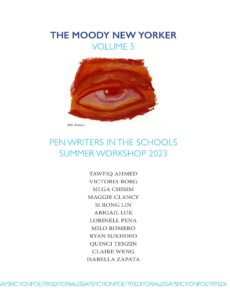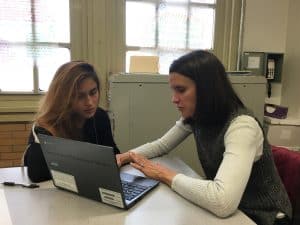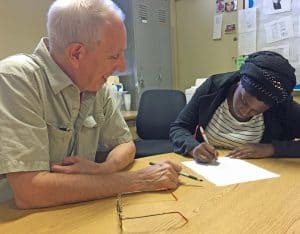PEN America Writers in the Schools Committee
Now in its twelfth year, Writers in the Schools places PEN America members in New York City schools that serve students from under-resourced communities. Our goal is to help students gain the kind of mastery over the written word that writers treasure, but that is all too rare even for talented young people in big urban school systems. James Traub currently chairs the committee. The executive director is Ellie Stimpson.
The program began in the fall of 2013, when volunteers from PEN America agreed with teachers and administrators from the Manhattan Center of Science and Math in East Harlem to work as writing tutors in class and after school, and to advise students working on the school newspaper. Soon we added more schools and more tutors. We have operated in over a dozen or so schools, in every borough save Staten Island. We work in big, classic public high schools and in smaller and more unorthodox charter schools. Virtually all of our students come from working-class or impoverished backgrounds.
Volunteers work with students and teachers to build skills, conduct creative writing workshops and writing clubs, and oversee the publication of literary magazines and school newspapers. Some tutors work alongside teachers in class, while others work directly with students, usually after the school day. Tutors are expected to work an hour or so per week. Some of the work is in person and some remote, by Zoom. The work has been hard, sometimes frustrating, but often inspiring. We have found that students are eager to listen and learn—and often fascinated to hear about what it means to be a writer.
Summer Writers Workshop
In the summer of 2019 we began a new project—the PEN Summer Writers Workshop. We are now looking forward to our sixth year. The workshop runs for three weeks in July; four days a week, from 9 to 1, PEN tutors meet in an NYU classroom with a group of fifteen or so New York City high school students. We talk about techniques of fiction and non-fiction writing; the students work with tutors, and with one another, on writing exercises, gradually building up their skills so that by the third week—when we meet remotely—they are prepared to write, and to re-write and re-re-write, a story or essay or argument that will be published in our annual magazine, The Moody New Yorker. The fact that so many of our students return from year to year lets us know that we are reaching them in a profound way.

To volunteer or to learn more about the Writers in the Schools Committee, please contact us at [email protected].
Current School Programs

Nell Freudenberger (right) at The Brooklyn Collaborative School
Brooklyn Collaborative School is a progressive and highly effective school serving students in grades six to twelve. PEN Writers has three volunteers working alongside an extraordinarily gifted and enthusiastic English teacher in 12th-grade classes.
Townsend Harris is the descendant of the storied institution that for generations served as the feeder school for City College. Today, it serves the same population of immigrant strivers but from the campus of Queens College. Students produce a very impressive newspaper as well as a magazine. Three volunteers work with students on the newspaper and magazine as well as on other extracurricular projects.

Peter Gelfan (left) at The Manhattan Center for Science and Math
MCSM is a public high school that serves students who score in the upper half of the distribution in standardized science and math tests. MSCM was the first school with which PEN America began working. We now have four volunteers working in an after-school tutoring program, chiefly working with students on college essays and another who until last year served as the advisor to the school’s award-winning newspaper, RamPage.
Urban Academy is a highly successful progressive high school that eschews standardized curriculum and testing in favor of multi-aged grouping and performance assessment. A volunteer works with students on essays written for Social Studies and English classes.
Legacy is a combined middle and high school in the South Bronx. A volunteer works with middle school students on creative writing in an after-school club.
The iSchool is a small-scale progressive school in SoHo. A volunteer works with the college counselor to help students with college essays.
BAL is a combined middle and high school which is part of the Urban Assembly, a network of 23 small-scale high-performing schools in New York.
We have begun to work in collaboration with a nonprofit, PressPass NYC, to help schools eager to start up newspapers. We have currently begun to work with two schools, with more to come.
Volunteer Testimonials
Peter Gelfan
“Our crew of five works at the Manhattan Center for Science and Math (MCSM) in East Harlem. Over the past few years, we have focused on helping seniors with their college application essays. For most of our tutees, the only writing they’d done before was for homework assignments—in essence, practice writing. Now, suddenly, they were facing the real thing: writing something that could have a huge direct effect on the rest of their lives. Some readjusted to this escalation in stakes, responsibility, and effort faster than others.
Often the student would start with a generic bio or “Why I Want to Become a Doctor” or the like. But with some gentle questioning, most of them realized this essay wasn’t a matter of spouting back what was expected, but that they needed to open up and show what sort of a person they are, something that was true for them and, from the point of view of the colleges, made them unique, deserving, and valuable. Many of the stories we read from these diverse kids from all over the world about their journeys and struggles were astounding and humbling. As well, often students had never before reflected on these situations or episodes nor realized what they’d learned from them and how that would affect their futures—some had even grown up taught to be ashamed of their backgrounds. Many of our tutees expressed their gratitude not only for the essay help but also for the deepened understandings about themselves, their lives, and how they thought and communicated about them. Here’s one sample, to PEN editor Natalie Standiford:
‘Thanks to the time you put into reviewing, editing, and improving my essays, I can proudly say I got accepted into 15 colleges, Boston University being among them. You played one of the most significant roles in my application process, and I could never be more grateful. I hope future students like me can get the opportunity to work with PEN writers like you because I know that with your help, they are guaranteed success. ~ N.O.’
Sofia Groopman
“This year, before school even began, Townsend Harris High School’s student paper, The Classic, made national news when it broke the story that the HEPA filters the DOE had purchased for the city’s classrooms were not the ones the CDC had recommended for slowing the spread of Covid. This is when we, three lucky PEN tutors assigned to advise the enterprising students of Townsend Harris, stepped in—one of us worked with the paper’s faculty advisor to vet the story, and then publicize it when it was published. This is the role we often play; we are their editors, yes, helping them refine and execute their ambitious visions, but also publicists for their extraordinary endeavors. We marshal not only our experience as writers and journalists but also every connection we have to ensure that their hard work resonates far beyond the schools’ walls.
Around the same time, one sophomore came to the paper’s faculty advisor with an idea. He wanted to start a film reviewing podcast that would compete with the nation’s top critics. He felt that much film criticism was out of touch with young people’s opinions and views of the world. I was lucky enough to be matched up with the burgeoning podcast team even before the school year began. I met weekly with the team and organized a Q&A with two experienced podcast producers (one from The New Yorker, and the other from Gimlet). I also reached out to all the major film production companies and publicity firms and secured a meeting between Townsend Harris’ podcast team and a publicist at NBC/Universal, at which the students so wowed the studio folk that they received invitations to the studio’s advance screenings. Armed with advice from experienced podcast producers and press credentials from a major studio, the student producers selected three hosts—all women of color eager to break into the often white, male-dominated world of film criticism—to share their opinions weekly on the latest movies and tv shows. The result is a lively, often hilarious, professional-grade podcast that has released 23 episodes and earned 270 5-star reviews on Apple Podcasts.”
Nell Freudenberger
“During the first semester of each year at BCS, PEN writers work with high school seniors on personal essays. It’s wonderful to encounter a student who enjoys reading and writing outside of school and to help them polish an inspired essay, but it’s equally rewarding to work with less sure-footed students, who might take longer to develop an idea. Often those are the students who become the most excited when they discover that they do indeed have something important to say. After working at BCS for many years, I’m no longer startled by the ability of very young people to tell incredible stories, but those stories never cease to amaze me.
During the second semester, the students work on an analytic paper that caps their four years of English Language Arts. They practice using a theoretical lens to examine literary texts, from classics like Baldwin’s “Sonny Blues” to more recent work by Anna Zeigler, Justin Torres, and Walter Dean Myers. Often their responses to these works surprise or move me. BCS students have called me out on my own biases, and also have made me look at works of literature I thought I knew well from the perspective of someone born in another country or the (often less familiar) perspective of someone born in the 21st century.
It’s a cliché to say that teachers learn more from their students than the students do from them, but in my case it’s undeniable. When I started in the PEN writers-in-the-schools program, I was pregnant, and my students in the South Bronx used to insist on walking me to the subway if it was dark out. (This was sweet, if a little mortifying.) My oldest child is now starting high school herself, and this program is still one of the most gratifying and inspiring parts of my life. I’m thankful for the opportunity to work with these amazing kids and plan to continue with the program for as long as they’ll have me.”
Ellie Stimpson
“I started volunteering as a writing tutor at the Bronx Academy of Letters in 2020 when I was an undergraduate at NYU. Four years later, I am still tutoring at Bronx Academy and volunteering with PEN America. My experience with the students at Bronx Academy has been nothing short of inspiring. I work with seniors to help compile their college applications. The college process is long and stressful for anyone, not to mention the added challenges of language barriers and support for the students at Bronx Academy. For many students, English is their second language and they do not have access to the college prep that other students may have.
The college essay is basically asking students to pour their heart out into 600 words. A lot of the work is building trust with them in order to have comfortable and open conversations about their stories. Students are excited to talk to you about their families and their interests, whether it be musical theater, computer programming, social and criminal justice or poetry. You come to really get to know the students and they come to know you, in my experience, creating some lovely bonds and friendships. From one of my former students, ‘You were super patient with me throughout the entire process even when I changed the whole entire essay twice! I didn’t even feel like you were a mentor. It felt like I’ve known you for such a long time.’ This student ultimately got accepted to NYU and joined their freshman class as a Nursing major.
These students deserve every opportunity to be proud of their story and their voice. It is wonderful to see them get excited about their own stories, backgrounds, families and communities, when the writing finally clicks into place and they are proud to hit send on their applications.”





